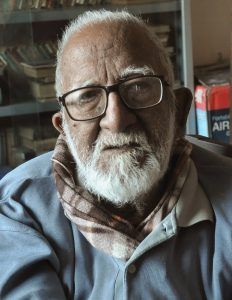
Abney Golam Samad, a man with the gift of immense
diversified knowledge and expertise, was a venerable personality. He was a veteran
Academician, Anthropologist, Historian, Author, Reviewer, and an Influential
Analyst on contemporary politics simultaneously. He was born in 1929, Rajshahi
during the British colony. Through his life span he witnessed the British Raj,
united Pakistan’s days, and eventually breathed his last as a free civilian in
independent Bangladesh. He was born to Mohammad Yeasin Ali and Nasirun-Nesa.
His father was a passionate writer and a Railway Master by profession in Bogra
railway station. Among his siblings, his most well-known sister Doulatun-nesa
happened to be a famous political leader, writer, and right-wing activist. She
was an MLA of East Pakistan in 1954, probably the only woman elected. She was
an active participant of Gandhi’s movement which resulted in her imprisonment.
She took part in the protest as per Mahatma Gandhi’s calling as a part of
‘Lobon Satyagraha’. Dr. Samad asserted that his sister’s political involvements
and alliances helped him to come in
touch with phenomenal leaders such as, AK Fazlul Haque, Hossain Shaheed
Sohrawardy, Maulana Bhashani, Sheikh Mujibur Rahman and so forth. He then took
part in the election processions of his own sister at a young age with these
mentioned leaders. Later, at an early age prof. Samad happened to participate
in his sister’s election campaigns along with those phenomenal political
personalities.
Although he started his educational life in Rajshahi
Collegiate school, he passed his School Leaving Certificate (equivalent to
Secondary School Certificate ) from the Bishnupur Shiksha Shangha,24 pargana,
West Bengal in 1948. Later, he passed his Higher Secondary in 1949 from
Rajshahi College and completed his undergrad from Tejgaon Agriculture
Institute, now known as Sher-E-Bangla Agricultural University. After his
graduation from Tejgaon Agriculture Institute, he enrolled to Leeds University
and persuaded his Post-Graduate Diploma in Plant Pathology. Completing his post-
grad he focused on his Ph.D . He conducted his thesis on plant viruses which he
earned from the University of Poitiers,France. After 4 years of reside in France, in 1963 he
concluded his thesis on Plant Viruses and achieved Ph.D. The thesis was
published in French language. After Spending a long time overseas, he flew back
to home in 1965 and started his career as a lecturer of Plant Science,
University of Rajshahi.
Abney Golam Samad is considered to be a freedom fighter but
he rarely endorsed it in public. However, Dr. Samad had been affiliated with
political leaders since he was very young.
During the pre-liberation war period, in the movement against General
Ayub in 1969 he witnessed the martyrdom of his colleague Dr. Zoha. In 1971,
Samad sided himself to reach Kolkata to take part in the Liberation War. He
became a part of ‘Joy Bangla’ publication which was a foremost voice of freedom
of Bangladesh. He there, worked as a news-writer with the likes of former president Zillur
Rahman, Abdul Gaffar Chy, Abdur Latif Siddiqui, Asad Chowdhuri, and many more.
There, prof. Samad came in touch with well -known authors like Zahir Rayhan,
Ahmad Sofa. He even arranged accommodation for Zahir Raihan while staying there
in his exile. He had always been very concerned and raised his voice after
Zahir Rayhan went missing in 1972. Samad was never tired of participating the
movements against the tyrants even after the independence of Bangladesh. He
took part in Maulana Bhashani’s most fierceful Long March in 1976. He met
Sheikh Mujib in various informal programs in Rajshahi.
After educating for 30 illustrating years he put an end to
his professional life and retired from Rajshahi University in 1996.But dr.
Samad never stopped writing. He tried to satisfy the appetite of his readers even
on his deathbed. In addition to writing, he constantly attended seminars on
various platforms and delivered speeches. As a writer, dr. Samad has always
considered himself as a ‘general physician’ who could give medicine for most of
the diseases but was not a specialist. He used to compare himself with a mason;
as he could not bring out anything new but could create something if he would
get the essential materials.
He wrote numerous articles on Sikandar Abu Jafar’s
influential magazine ‘Samakal. His penmanship is well-rounded with more than 20
books on Science, Anthropology, and History of Art & Culture. He
contributed various opinion pieces on several edited books and kept writing on a
number of dailies till his death.
He breathed his last on 15th August 2021 leaving behind all his eventful legacies. Stayed in his beloved Nasiran Villa till death came knocking. He suffered from many diseases like cardiac issues and Covid-19. Even after improving from Covid-19, his body eventually gave up and left all his well-wishers for good.